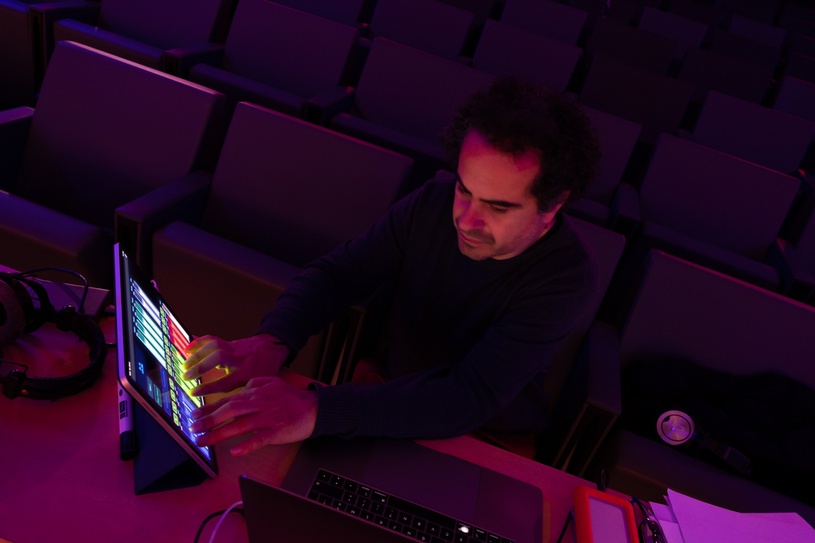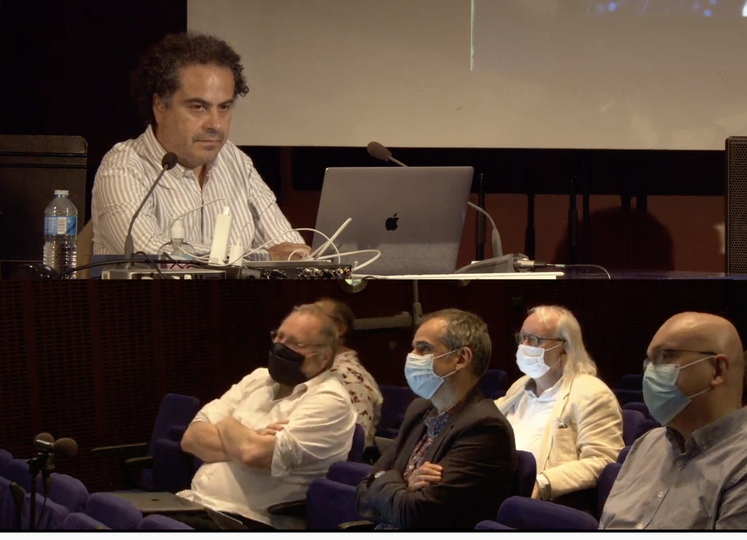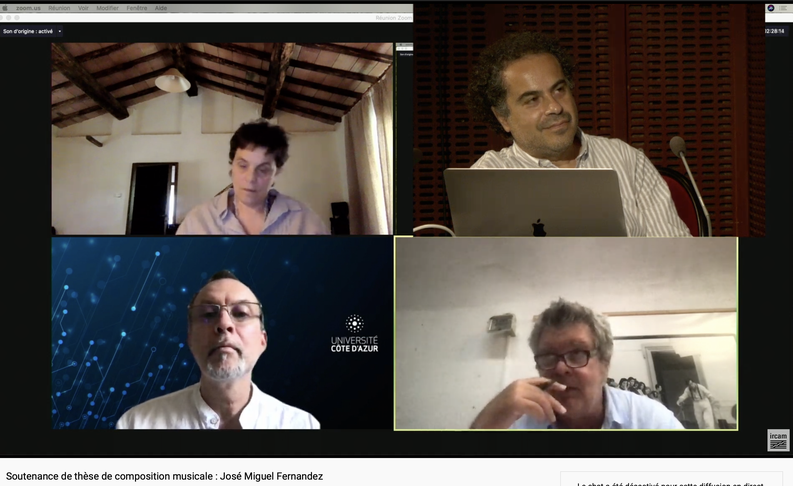Jose Miguel FERNANDEZ a soutenu sa thèse de composition musicale le mercredi 15 septembre 2021 à 14H30, intitulée :
"Vers un système unifié d’interaction et de synchronisation en composition électroacoustique et mixte : partitions électroniques centralisées"
que vous pouvez revoir sur le lien MEDIA de l'Ircam
Sa thèse est devant le jury :
Bonardi Alain, Maître de Conférence, Laboratoire Esthétique, musicologie, dance et création musicale Univ. Paris 8 - rapporteur
Trubert Jean-françois, Professeur des universités, CENTRE TRANSDISCIPLINAIRE D’ÉPISTÉMOLOGIE DE LA LITTÉRATURE ET DES ARTS VIVANTS Université de Nice - rapporteur
Manoury Philippe, Compositeur - examinateur
Spiropoulos Georgia, Compositrice - examinatrice
Orlarey Yann, Compositeur et directeur scientifique du GRAME, Centre National de Création Musicale - examinateur
Jean-Louis Giavitto, directeur de recherche CNRS - (STMS CNRS-Ircam-Sorbonne Université-Ministère de la culture) - directeur de thèse
Couprie Pierre, Professeur des universités, Centre d’histoire culturelle des sociétés contemporaines Univ. Paris Saclay - co directeur de thèse
Résumé
Avec l’avènement de l’informatique et son intégration dans le monde de la composition musicale, de nouveaux champs de recherche compositionnelle et sonore se sont ouverts. Mais si l’on voit depuis des années une pléthore de générateurs de son et de nouvelles techniques de synthèse, il y a peu de propositions d’outils qui adressent le contrôle et la construction formelle musicale électronique à plusieurs niveaux et qui permettent une intégration fine de l’écriture et des processus électroniques interactifs en temps réel dans la composition.
Le travail initié dans cette thèse vise à développer, dans le contexte des musiques interactives mixtes, électroacoustiques et audiovisuelles en temps réel, une notion de partition électronique centralisée permettant au sein d’un même environnement la définition, la composition et le contrôle général de tous les processus électroniques, leurs interactions et leurs synchronisations avec les événements musicaux, gestuels et visuels.
L’enjeu artistique est l’écriture et la réalisation d’interactions mettant en rapport la liberté interprétative de l’artiste sur scène et les processus sonores en temps réel à partir de dispositifs de captation efficaces et de mécanismes de synchronisation.
La centralisation et la coordination de ces interactions au sein d’une même partition ont pour objectif une intégration fine des processus électroniques dynamiques et génératifs avec différents médias temporels. Le développement des outils informatiques correspondant doit permettre, lors de l’interprétation d’une oeuvre musicale ou scénique, de réaliser les relations temporelles complexes exprimées dans la partition, en contrôlant en temps réel les flux d’événements interconnectant les performeurs, la partie électronique, le public, les équipements permettant de gérer les dispositifs scéniques et les systèmes de production, de diffusion et de transformation du son.
En s’appuyant sur des nouveaux langages plus expressifs pour l’écriture de l’électronique comme Antescofo et des systèmes performants de synthèse et traitement du signal comme SuperCollider, ce travail s’est concrétisé par le développement d’une librairie dédiée : AntesCollider. Cette librairie permet d’expérimenter des nouvelles approches de l’écriture de l’électronique à travers l’organisation et la composition de structures sonores, multitemporelles, multiéchelles et de l’interaction. En tirant partie des notions informatiques d’agents, de processus et d’algorithmes temps réel, ces structures sonores peuvent se combiner dynamiquement et polyphoniquement en relation avec des événements externes (captation gestuelle, interconnexion avec d’autres médias), ouvrant vers de nouveaux paradigmes compositionnels et renouvelant la liberté et la plasticité de la création musicale.


